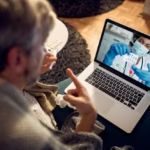Table of Contents
ToggleDermatology is a special field of medicine. It deals with skin, hair, and nail issues. The skin is the biggest organ and protects us from harm. Dermatologists know a lot about skin and how to fix problems.
They help with many issues, like acne and eczema. They also deal with serious problems like skin cancer. These doctors are trained to give the best care and make patients’ lives better.
Key Takeaways
- Dermatology is a medical specialty focused on the diagnosis and treatment of skin, hair, and nail conditions.
- Dermatologists undergo extensive training to become experts in their field, including medical school and a specialized residency program.
- The skin serves as a protective barrier and plays a crucial role in overall health and well-being.
- Dermatologists treat a wide range of common and complex skin disorders, from acne to skin cancer.
- Personalized care and tailored treatments are hallmarks of modern dermatological practice.
The Fundamentals of Skin Anatomy and Function
The skin is the body’s largest organ. It acts as a vital protective barrier against the outside world. It has three main layers: the epidermis, dermis, and subcutaneous tissue. Each layer has its own role in keeping the skin healthy and functioning well.
Understanding the Three Main Layers of Skin
The epidermis is the outermost layer. It creates a waterproof barrier to shield the body from harm. It has several sublayers, like the stratum corneum and stratum basale.
The dermis is below the epidermis. It’s filled with collagen and elastin fibers. These give the skin its structure, support, and flexibility.
The subcutaneous tissue, or hypodermis, is the deepest layer. It’s made of fat that keeps the body warm and protects it from injury.
How Your Skin Protects and Regulates Body Functions
The skin’s layers work together to defend against UV radiation, chemicals, and germs. It also helps control body temperature, keeps moisture levels balanced, and aids in sensing the environment. Different skin cells, like melanocytes and Langerhans cells, help with these tasks.
The Role of Skin in Overall Health
The skin is more than just a barrier. It’s connected to our overall health. Issues like acne, eczema, and skin cancer can signal problems inside the body. Taking care of the skin can improve our overall health and quality of life.
“The skin is a mirror of the body’s internal environment, reflecting the overall health and well-being of an individual.”
Exploring the Field of Dermatology

Dermatology is a wide-ranging medical field. It deals with many skin issues, from acne to skin cancer. Dermatologists use advanced methods to diagnose and treat these problems.
There are many areas within dermatology. For example, pediatric dermatologists work with children’s skin issues. Mohs surgeons use a special surgery for skin cancer. Cosmetic dermatology focuses on making skin look better with treatments like fillers and laser therapy.
Dermatopathology is a part of dermatology that studies skin diseases under a microscope. Dermatologists can specialize in different areas, giving patients the care they need.
Dermatology practices differ across the U.S. They depend on the area and the patients there. Urban areas near medical centers might offer more advanced care. Rural areas help those who can’t get to big cities.
Dermatologists lead in medical research. They work on new treatments and improve old ones. They keep up with the latest to give the best care for skin, hair, and nails.
| Dermatology Subspecialty | Key Focus |
|---|---|
| Pediatric Dermatology | Skin, hair, and nail diseases in children, including newborns and infants |
| Mohs Surgery | Specialized procedure for treating skin cancer |
| Cosmetic Dermatology | Improving skin appearance with treatments like dermal fillers, Botox, chemical peels, and laser therapy |
| Dermatopathology | Studying diseases of the skin, hair, and nails at a microscopic level |
“Dermatology encompasses the diagnosis and treatment of over 3,000 skin diseases, making it a diverse and ever-evolving field of medicine.”
Common Skin Conditions and Their Impact
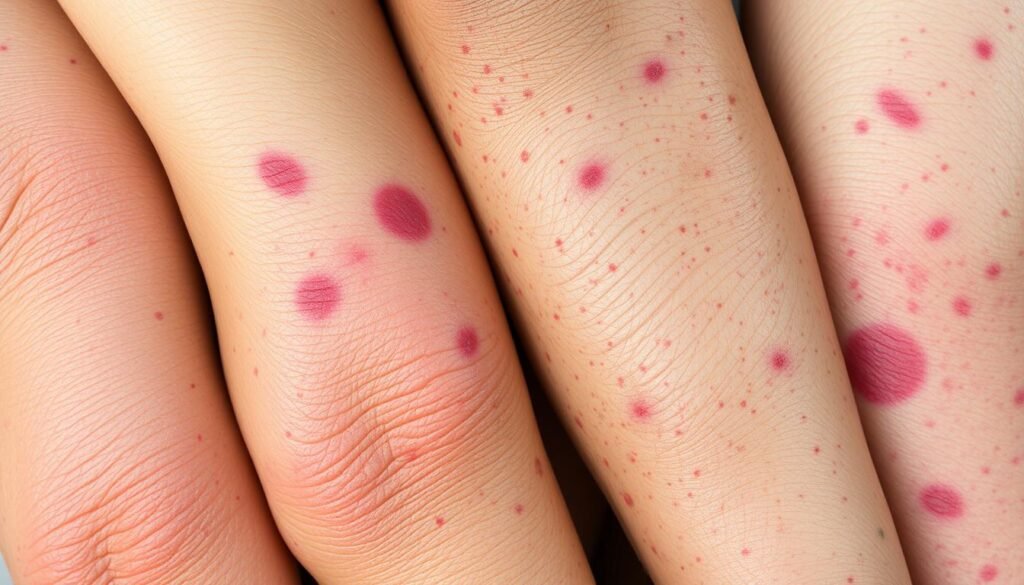
Skin conditions like acne, eczema, psoriasis, rosacea, and sensitive skin can really affect a person’s life. They cause discomfort and make people feel self-conscious. Luckily, dermatologists can help with treatment plans to make skin healthier.
Acne and Its Various Forms
Acne can show up in many ways, such as redness, blackheads, and pimples. It can also leave dark spots on darker skin. It affects the face, neck, and back, impacting millions each year.
Eczema and Psoriasis Management
Eczema causes itchy, flaky patches on the skin. It affects many children and some adults, costing a lot for treatment. Psoriasis leads to scaly patches, costing billions each year for treatment.
Rosacea and Sensitive Skin Concerns
Rosacea causes red blisters near the mouth, affecting many. It can also cause dark patches on darker skin. Sensitive skin can make people uncomfortable and lose confidence.
“Dermatologists play a crucial role in helping patients manage these common skin conditions, working to alleviate symptoms, improve quality of life, and provide personalized treatment plans tailored to each individual’s unique needs.”
Advanced Diagnostic Techniques in Modern Dermatology
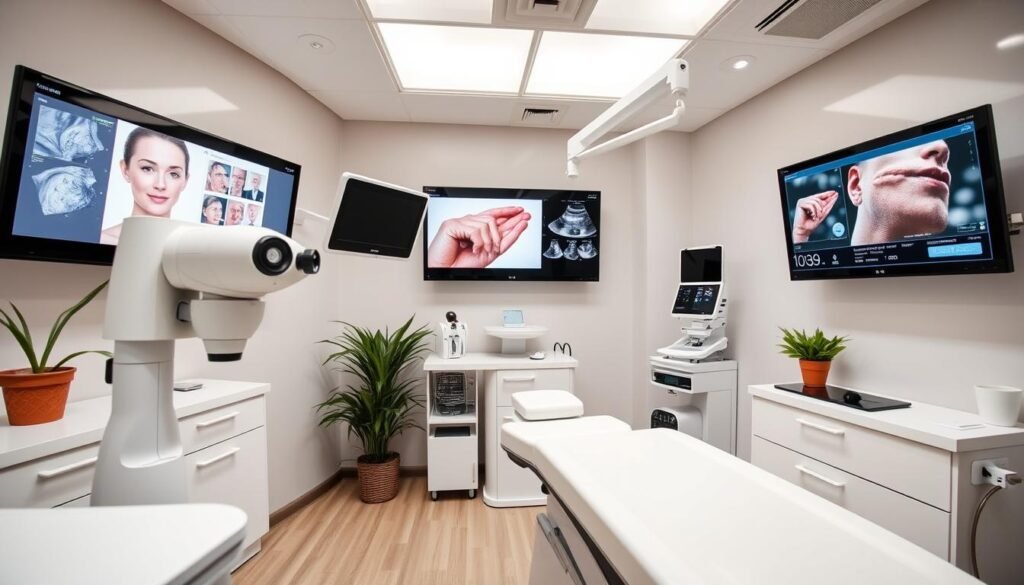
Dermatology is always changing, and new tools are key for spotting skin problems. These tools help doctors give exact diagnoses and make treatment plans that work.
Dermoscopy lets doctors look closely at skin spots. They use special microscopes to see things we can’t see. This helps find skin cancer and other issues early.
Skin biopsy involves taking a small skin sample for a microscope check. It shows what’s going on in the skin, helping doctors understand the problem better.
Patch testing is great for finding out what causes skin allergies. Doctors put small amounts of possible allergens on the skin. Then, they watch how the skin reacts to find the problem.
| Diagnostic Technique | Description | Benefits |
|---|---|---|
| Dermoscopy | Examination of skin lesions using a specialized handheld microscope | Enables early detection of skin cancer and other skin disorders by revealing subtle features not visible to the naked eye |
| Skin Biopsy | Removal and microscopic analysis of a small skin sample | Provides detailed information about the cellular and structural composition of the skin, aiding in accurate diagnosis and targeted treatment |
| Patch Testing | Application of potential allergens to the skin to identify triggers for skin allergies and sensitivities | Helps dermatologists pinpoint the root causes of skin reactions and develop personalized treatment plans |
These new ways of checking skin are changing how doctors work. They help give patients the best care and improve their lives.
Treatment Options and Therapeutic Approaches
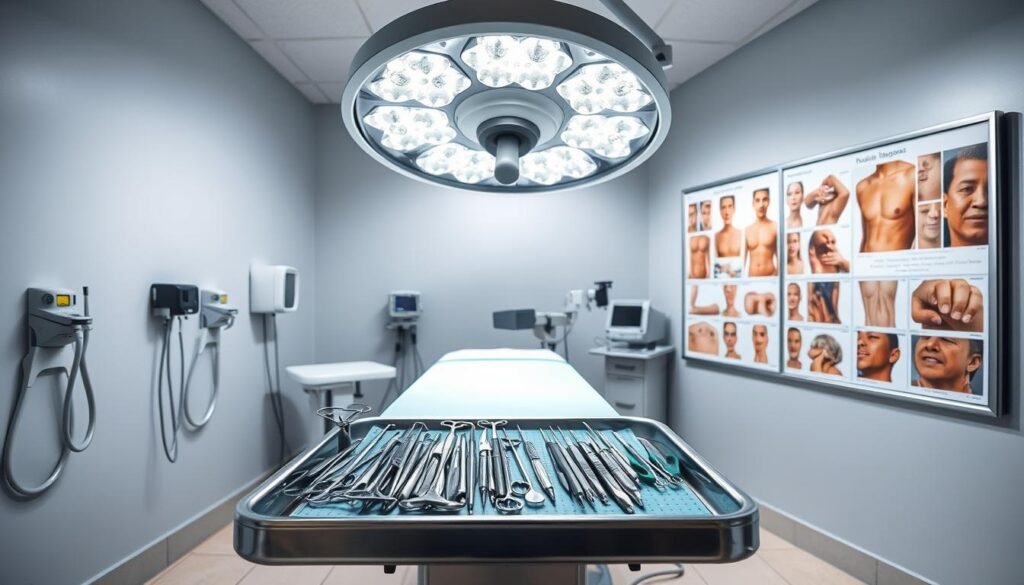
Dermatologists have many treatments for different skin problems. They offer everything from creams to new therapies. This helps patients get healthier, glowing skin.
Topical Medications and Their Applications
Topical treatments like creams and gels are often the first choice. They include retinoids and benzoyl peroxide. These help reduce inflammation and prevent breakouts.
Systemic Treatments for Skin Conditions
For more serious skin issues, doctors might use systemic treatments. These can be oral antibiotics or isotretinoin (Accutane). They target the root cause of the problem from inside the body.
Innovative Therapies and Procedures
Dermatologists also use new therapies and procedures. These include phototherapy and laser treatments. They help with acne, eczema, and even skin cancer.
By working together, dermatologists and patients create a treatment plan. It might include creams, pills, and new therapies. This approach helps improve skin health.
“Understanding the patient’s goals, discussing evidence-based conventional and complementary treatment options, and employing shared decision-making can enhance the physician-patient relationship in dermatology.”
Preventive Care and Skin Cancer Screening

Preventive care is key in dermatology, focusing on skin cancer prevention and regular screenings. Dermatologists teach patients about using sunscreens and wearing protective clothes. They also advise seeking shade during peak sun hours to protect their skin.
Regular skin checks by board-certified dermatologists can catch skin cancer early. This leads to better treatment and outcomes. The Skin Cancer Foundation notes that skin cancer is the most common cancer worldwide, with over 1 million new cases in the U.S. each year.
Even though free skin cancer screenings are available in May, many can’t access them. Insurance issues and a lack of dermatologists make it hard for people to get checked. This is a big problem.
The White House’s Cancer Moonshot aims to cut cancer deaths by 50% in 25 years. Former acting surgeon general Boris D. Lushniak said, “Skin cancer is increasingly common but is fully treatable if detected early.”
By focusing on preventive care and making screenings easier, we can help people protect their skin. Regular visits to a dermatologist are a simple way to stay healthy.
| Statistic | Value |
|---|---|
| Skin cancer cases diagnosed annually in the U.S. | More than 1 million |
| Reduction in cancer deaths targeted by the White House Cancer Moonshot | 50% over 25 years |
| People at higher risk for skin cancer due to tanning bed use | Increased risk of basal cell carcinoma, squamous cell carcinoma, and malignant melanoma |
| Time of day when the sun’s rays are most intense | 10 a.m. to 4 p.m. |
The Role of Board-Certified Dermatologists
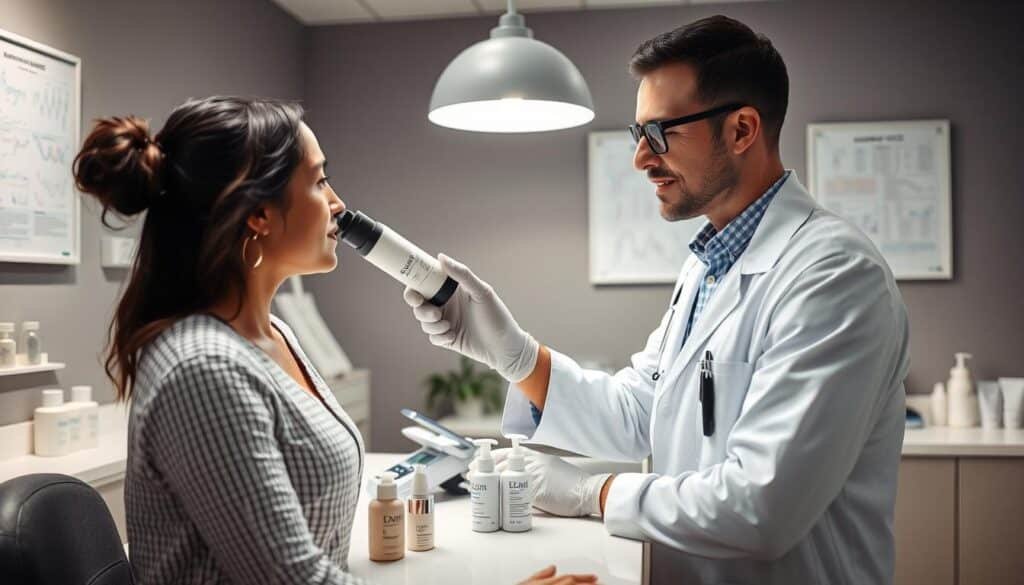
Board-certified dermatologists are key to keeping skin healthy and solving many skin problems. They get their certification after a lot of training and exams from the American Board of Dermatology (ABD).
Educational Requirements and Specialization
To become certified, doctors must finish an internship and then three years of dermatology residency. This training helps them understand the skin well and know the latest in dermatology.
Areas of Expertise in Clinical Practice
These doctors are experts in many areas. They can handle skin issues like acne and eczema, and even skin cancer. They also do cosmetic treatments like Botox and laser therapy to improve skin looks.
Continuing Education and Research
Dermatologists keep their certification by staying updated. They join the Continuing Certification Program (CCP) at the ABD. This keeps them learning new things in dermatology.
Choosing a board-certified dermatologist means you get top-notch care for your skin. They work hard to give great results and make patients happy and healthy.
Cosmetic Dermatology and Aesthetic Treatments

Cosmetic treatments are now more popular than ever. They help improve skin looks and boost confidence. Cosmetic dermatology focuses on non-surgical procedures for many skin issues. This includes fine lines, wrinkles, and unwanted hair.
Board-certified dermatologists lead this aesthetic change. They offer many cosmetic dermatology services to enhance skin health and looks. Injectables like Botox and dermal fillers smooth out lines and add volume. Laser treatments fix sun damage, pigmentation, and unwanted hair.
Non-surgical body contouring techniques are also popular. They help achieve the desired look without surgery. Dermatologists focus on natural results and safety, making sure you have a great experience.
If you want a youthful glow or to fix a skin issue, cosmetic dermatology has many aesthetic treatments for you. Working with a board-certified dermatologist can start your journey to better skin and confidence.
“Cosmetic dermatology is not just about improving appearances; it’s about empowering individuals to feel their best and most confident selves.”
Maintaining Healthy Skin Through Proper Care

To keep your skin healthy, you need a good skincare routine that fits you. This routine should include cleansing, moisturizing, and protecting your skin from sun damage. A board-certified dermatologist can help you choose the right skincare products and create a routine that works.
Cleansing is key to get rid of dirt, extra oil, and dead skin cells. Dermatologists suggest using gentle, non-irritating cleansers. These keep your skin’s natural barrier strong. Moisturizing is also important to keep your skin hydrated and prevent dryness.
Protecting your skin from UV rays is crucial. Dermatologists recommend using a broad-spectrum sunscreen with at least SPF 30. Remember to reapply sunscreen every two hours when you’re outside. Try to stay out of the sun between 10 a.m. and 4 p.m. to avoid sun damage.
Dermatologists might also suggest special treatments like exfoliation, serums, and masks for your skin. These can help with specific skin issues and keep your skin healthy. Taking care of your skin is important for a youthful and radiant look.
“Healthy skin is the foundation for overall well-being. A consistent, personalized skincare routine is key to maintaining vibrant, resilient skin.” – Dr. Sarah Wronski, Board-Certified Dermatologist
Understanding Dermatology in Special Populations
Dermatology is a field that meets the skin health needs of many groups. It helps children, older adults, and people with different skin tones. Specialized care is key for their skin health and wellbeing.
Pediatric Dermatology Considerations
Pediatric dermatologists treat skin issues in kids. They focus on infants, children, and teens. Kids’ skin is different from adults’, so they need special treatments.
They deal with problems like eczema, acne, warts, and birthmarks. These are common in young patients.
Geriatric Skin Care Needs
As people get older, their skin changes a lot. This means they need special geriatric skin care. Dermatologists for older adults handle issues like dry skin and a higher risk of skin cancer.
Keeping older adults’ skin healthy is vital. It helps them live better and enjoy life more.
Skin of Color Concerns
People with skin of color face unique skin challenges. Dermatologists who know about diverse skin tones can help. They deal with issues like dark spots, scars, and acne.
It’s important to have diverse and inclusive dermatology. This ensures everyone gets the care they need, without bias.
Dermatology is complex and must meet the needs of many patients. By focusing on pediatric dermatology, geriatric skin care, and skin of color, dermatologists can give everyone the care they deserve.
Also Read : Top Must-haves In A Medical Emergency Kit: From First Aid To Life-saving Tools
Conclusion
Dermatology is key to keeping our skin healthy and our bodies well. Dermatologists help with common issues like acne, eczema, and psoriasis. They also offer advanced cosmetic treatments.
The field of dermatology has made big strides. New treatments like monoclonal antibodies have changed how we manage skin diseases. This has greatly improved care for patients.
Knowing the value of professional dermatology care is important. It helps us keep our skin looking good and feeling healthy. Skin conditions are a big problem worldwide, especially for women.
As we keep learning more about skin health, the future looks bright. Working with board-certified dermatologists and taking care of our skin early on is key. This helps us stay healthy and enjoy a better life.
FAQs
Q: What is dermatology?
A: Dermatology is a medical specialty that focuses on the diagnosis and treatment of skin diseases, including conditions like acne, psoriasis, eczema, and skin cancer.
Q: How can I find a board-certified dermatologist?
A: You can search for a board-certified dermatologist through the American Board of Dermatology website or the American Academy of Dermatology, which provides resources to locate qualified dermatologists in your area.
Q: What is the significance of skin cancer screening?
A: Skin cancer screening is crucial for early detection and diagnosis of skin cancers, which allows for timely intervention and treatment. Regular screenings can help identify suspicious moles or skin changes that may indicate skin cancer.
Q: How does a dermatologist diagnose skin conditions?
A: A dermatologist diagnoses skin conditions through a thorough examination of the skin, along with patient history. In some cases, they may perform a biopsy or other diagnostic tests to confirm the diagnosis.
Q: What types of therapy are available for skin conditions?
A: Various therapies are available for skin conditions, including topical treatments, oral medications, light therapy, and advanced procedures like Mohs surgery for skin cancer. Treatment plans are tailored to each patient’s specific needs.
Q: What are the benefits of seeing a board-certified dermatologist?
A: Board-certified dermatologists have undergone extensive training and are certified by the American Board of Dermatology. They are equipped to provide the best care for a wide range of dermatological issues, ensuring accurate diagnosis and effective treatment.
Q: How can I maintain healthy skin?
A: To maintain healthy skin, it is important to follow a consistent skincare routine, protect your skin from sun damage, stay hydrated, and eat a balanced diet. Regular visits to a dermatologist can also help manage any skin concerns.
Q: What should I do if I notice changes in my skin?
A: If you notice any unusual changes in your skin, such as new moles, changes in existing moles, or persistent rashes, you should contact a board-certified dermatologist for evaluation and possible diagnosis.
Q: What resources does the American Academy of Dermatology provide?
A: The American Academy of Dermatology offers a variety of resources, including educational materials on skin care, disease prevention, access to dermatological research, and information on finding a qualified dermatologist.
